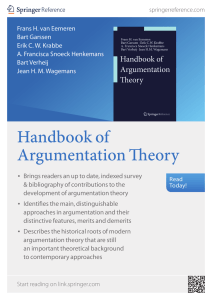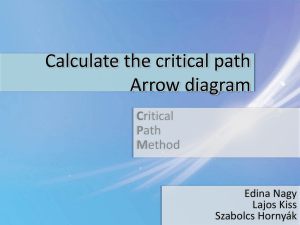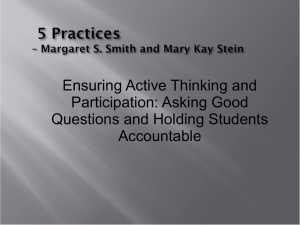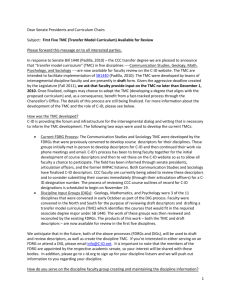Communications Studies Descriptors
advertisement
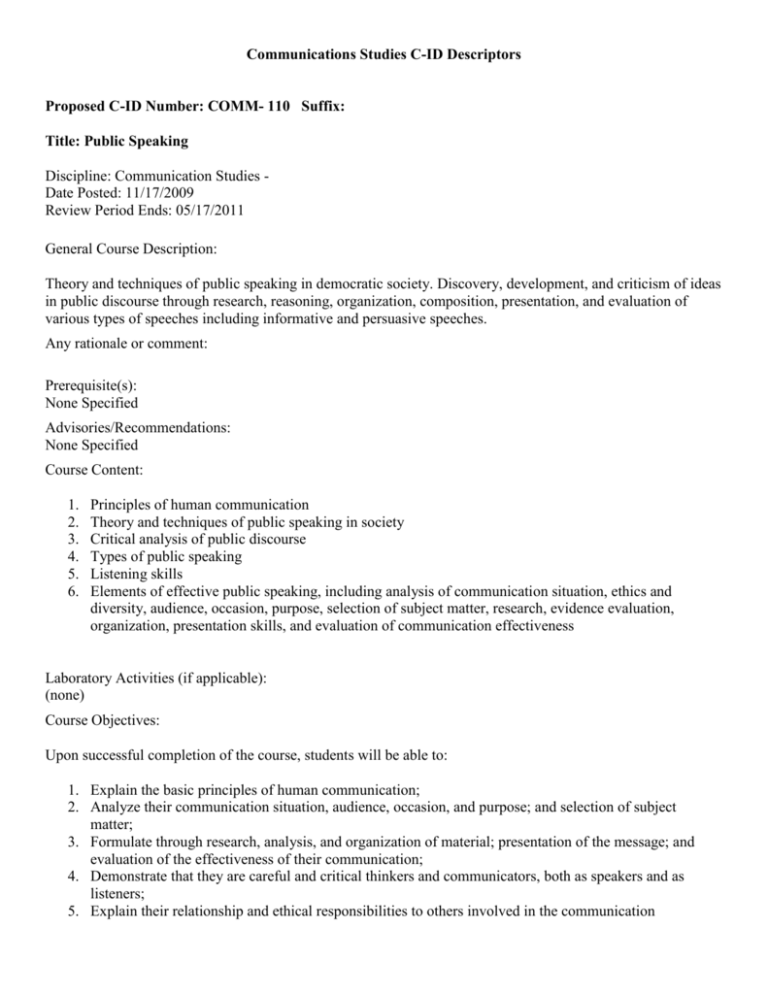
Communications Studies C-ID Descriptors Proposed C-ID Number: COMM- 110 Suffix: Title: Public Speaking Discipline: Communication Studies Date Posted: 11/17/2009 Review Period Ends: 05/17/2011 General Course Description: Theory and techniques of public speaking in democratic society. Discovery, development, and criticism of ideas in public discourse through research, reasoning, organization, composition, presentation, and evaluation of various types of speeches including informative and persuasive speeches. Any rationale or comment: Prerequisite(s): None Specified Advisories/Recommendations: None Specified Course Content: 1. 2. 3. 4. 5. 6. Principles of human communication Theory and techniques of public speaking in society Critical analysis of public discourse Types of public speaking Listening skills Elements of effective public speaking, including analysis of communication situation, ethics and diversity, audience, occasion, purpose, selection of subject matter, research, evidence evaluation, organization, presentation skills, and evaluation of communication effectiveness Laboratory Activities (if applicable): (none) Course Objectives: Upon successful completion of the course, students will be able to: 1. Explain the basic principles of human communication; 2. Analyze their communication situation, audience, occasion, and purpose; and selection of subject matter; 3. Formulate through research, analysis, and organization of material; presentation of the message; and evaluation of the effectiveness of their communication; 4. Demonstrate that they are careful and critical thinkers and communicators, both as speakers and as listeners; 5. Explain their relationship and ethical responsibilities to others involved in the communication transaction. Methods of Evaluation: Speech presentations in front of a live audience; speech outlines and bibliographies; critiques of speeches; quizzes and tests. Sample Textbooks or Other Support Materials: Kearney, P. Public Speaking in a Diverse Society. (latest edition). McGraw-Hill Lucas, S. The Art of Public Speaking. (latest edition). McGraw-Hill. O’Hair, D. A Pocket Guide to Public Speaking. (latest edition). Bedford/St. Martin’s Weaver, C. Essentials of Public Speaking. (latest edition). Thomson Proposed C-ID Number: COMM- 120 Suffix: Title: Argumentation or Argumentation and Debate Discipline: Communication Studies Date Posted: 11/17/2009 Review Period Ends: 05/17/2011 General Course Description: Methods of critical inquiry and advocacy. Identifying fallacies in reasoning and language, testing evidence and evidence sources, advancing a reasoned position, and defending and refuting arguments. Analysis, presentation, and evaluation of oral and written arguments. Any rationale or comment: Prerequisite(s): None Specified Advisories/Recommendations: (none) Course Content: 1. 2. 3. 4. 5. 6. Methods of critical inquiry, reasoning, and Advocacy and argumentation techniques Logical fallacies Research skills, analysis and evaluation of evidence and sources Critical analysis of discourse Analysis, presentation, and evaluation of oral and written arguments Laboratory Activities (if applicable): (none) Course Objectives: 1. 2. 3. 4. 5. 6. Learn to critically evaluate reasoning and evidence. Develop an understanding of the reasoning process and skill in utilizing various methods of reasoning. Learn how to analyze, advocate, and criticize ideas, especially through the process of debate. Learn to recognize fallacies of reasoning. Develop research skills. Foster the use of critical thinking skills in oral and written communication. Methods of Evaluation: Oral presentation of arguments; examinations; evaluation of the oral arguments of others; written analysis of reasoning and arguments; use of appropriate evidence from research. Sample Textbooks or Other Support Materials: Rybacki, D. & Rybacki, K. Advocacy and Opposition. (latest edition). Allyn & Bacon. Crossman, M. Burden of Proof: An Introduction to Argumentation and Guide to Parliamentary Debate. (latest edition). Custom Publishing. Proposed C-ID Number: COMM- 160 Suffix: B Title: Forensics (Speech & Debate) Discipline: Communication Studies Date Posted: 03/24/2009 Review Period Ends: 05/31/2011 General Course Description: Preparation, including research and writing; practice; and participation in intercollegiate speech and debate tournaments and/or community events. Any rationale or comment: The course is both lecture and lab. Prerequisite(s): (none) Advisories/Recommendations: (none) Course Content: 1. Overview of forensics (debate formats; platform; limited preparation; oral interpretation; readers’ theater) and/or community events 2. The application of theory and principles of communication to forensics and/or community events 3. Information Competency as it pertains to the research, analysis and writing for at least one event 4. Practicing advocacy and presentational skills for at least one event 5. Participation in at least one competitive forensics and/or community event 6. Ethics and etiquette for event participation Laboratory Activities (if applicable): 1. The application of Information Competency as it pertains to preparing for event participation 2. Practicing under the guidance of coaches and with peers in preparation for competitive forensics and/or community events 3. Participation in competitive forensics and/or community events 4. Post-event participation evaluation and self-reflection under the guidance of coaches and peers Course Objectives: 1. Distinguish major types of competitive speeches. 2. Employ the tools of Information Competency including but not limited to logical thinking, effective advocacy, appropriate use of forms of support, and critical deliberation for event preparation. 3. Exhibit the ability to write for the ear in addition to writing for the eye. 4. Integrate coach, peer, and self-critique for the purpose of speech and delivery improvements. 5. Increase speaking effectiveness and confidence by managing communication apprehension. 6. Demonstrate improvement in delivery skills 7. Foster personal growth as a result of the competitive forensics experience. Methods of Evaluation: Class and laboratory participation. Written assignments. Participation in forensics tournaments and/or community events. Sample Textbooks or Other Support Materials: The nature of this class allows for the use of a variety of materials identified by the instructor such as: Current Event Publications, Sample Speeches, Instructor-Created Resources. Proposed C-ID Number: COMM- 170 Suffix: Title: Oral Interpretation of Literature Discipline: Communication Studies Date Posted: 03/24/2009 Review Period Ends: 05/31/2011 General Course Description: Introduction to performance studies; analysis, appreciation, and application of theories of interpretive performance of various forms of literature including poetry, prose, and drama (plays, scripts and screenplays). Any rationale or comment: Prerequisite(s): (none) Advisories/Recommendations: (none) Course Content: 1. 2. 3. 4. 5. 6. 7. 8. 9. Nature, importance and ethics of oral interpretation Distinctions among reading, speaking, acting and interpretation Structure of dramatic action Methods of literary selection, analysis and cutting/editing Nature of and distinction between interpretation of prose, poetry and drama Verbal and nonverbal elements of performance Analysis of audience Performance of literature Critical listening and analysis of performance Laboratory Activities (if applicable): (none) Course Objectives: 1. 2. 3. 4. 5. 6. Demonstrate knowledge of what constitutes good literature. Distinguish between the various forms of literature Analyze and critique literature for the purpose of interpretation. Research and construct individual and/or group oral presentations for various audiences. Edit literature using techniques that focus on unity of time, place, action, mood and character Perform a variety of verbal and nonverbal skills to bring the literature to life and heighten the effectiveness of the performer's message Methods of Evaluation: Evaluation of performances, written work, and peer performances Examinations Participation in class activities Sample Textbooks or Other Support Materials: Latest versions of Lewis, Todd V.. Communicating Literature: An Introduction to Oral Interpretation. 4 ed. any:Kendall Hunt Publishing Company, 2008. Yordon, Judy E.. Roles in Interpretation. 5 ed. any: McGraw Hill, 2002. Gura, T. & Lee, C. Oral Interpretation. 11th or 12th edition. Houghton-Mifflin Proposed C-ID Number: COMM- 180 Suffix: Title: Introduction to Communication Studies or Introduction to Communication Theory Discipline: Communication Studies Date Posted: 03/24/2009 Review Period Ends: 05/31/2011 General Course Description: A survey of the discipline of communication studies with emphasis on multiple epistemological, theoretical, and methodological issues relevant to the systematic inquiry and pursuit of knowledge about human communication. This course explores the basic history, assumptions, principles, processes, variables, methods, and specializations of human communication as an academic field of study. Any rationale or comment: Prerequisite(s): (none) Advisories/Recommendations: (none) Course Content: 1. 2. 3. 4. 5. 6. Foundations – Definitions and Context History of Communication Study Verbal and Nonverbal Communication Basic Communication Theory Basic Communication Research Methods Specializations May Include: a. Rhetoric b. Forensics c. Argumentation d. Persuasion e. Public Communication f. Mass Communication g. Interpersonal Communication h. Group Communication i. Intercultural Communication j. Gender Communication k. Organizational Communication l. Oral Interpretation/Performance Studies m. Communication Ethics n. Emerging Specializations 1. Health Communication 2. New Technologies 3. Computer Mediated Communication Laboratory Activities (if applicable): (none) Course Objectives: 1. 2. 3. 4. 5. 6. 7. 8. Explain and apply the basic concepts of the field of communication. Discuss the history of the study of human communication. Critically discuss and write about human communication theories and events. Compare and contrast the basic research methods for the evaluation of human communication phenomena. Explain the contextual, cultural, and social foundations of human communication. Demonstrate a basic knowledge of the specializations comprising the communication discipline. Demonstrate an understanding of ethical perspectives in communication. Summarize and explain an expanded world perspective that demonstrates an appreciation of the diverse range of individuals, communities, and viewpoints. Methods of Evaluation: Quizzes and examinations, projects, oral and written assignments, class participation, and other outside assignments. Sample Textbooks or Other Support Materials: Sarah Trenholm, Thinking Through Communication (latest edition). Boston: Pearson/AB, 2008. Julia Wood, Communication Mosaics (latest edition), Wadsworth. Tubbs and Moss, Human Communication, Principles and Contexts (latest edition). McGraw-Hill. Bourhis, J. Adams, C., Titsworth, S. & Hunter, L. Style Manual for Communication Studies. (latest edition). McGraw-Hill. Dues, M. & Brown, M. (latest edition). Boxing Plato’s Shadow: The study of human communication. McGrawHill. Griffin, M. (latest edition). A First Look at Communication Theory. McGraw-Hill Higher Education



